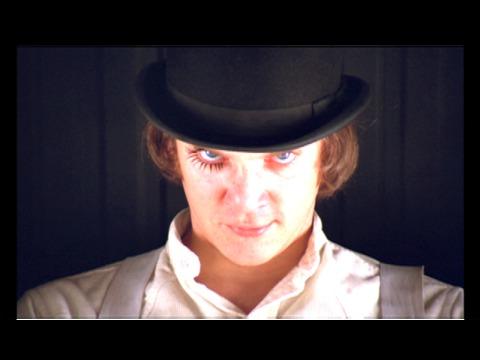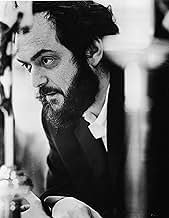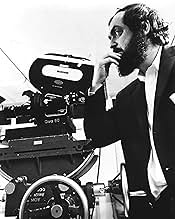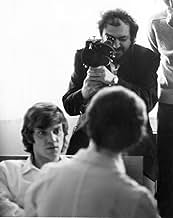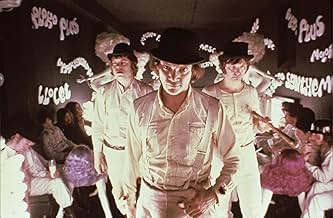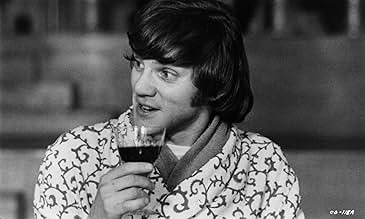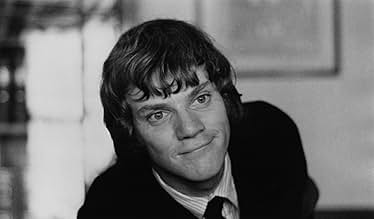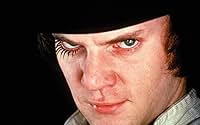Im Großbritannien der Zukunft sitzt der charismatische Delinquent Alex DeLarge im Gefängnis. Er meldet sich freiwillig für eine experimentelle Aversionstherapie, die von der Regierung zur Lö... Alles lesenIm Großbritannien der Zukunft sitzt der charismatische Delinquent Alex DeLarge im Gefängnis. Er meldet sich freiwillig für eine experimentelle Aversionstherapie, die von der Regierung zur Lösung des Kriminalitätsproblems entwickelt wurde - aber es läuft nicht alles nach Plan.Im Großbritannien der Zukunft sitzt der charismatische Delinquent Alex DeLarge im Gefängnis. Er meldet sich freiwillig für eine experimentelle Aversionstherapie, die von der Regierung zur Lösung des Kriminalitätsproblems entwickelt wurde - aber es läuft nicht alles nach Plan.
- Regie
- Drehbuch
- Hauptbesetzung
- Für 4 Oscars nominiert
- 12 Gewinne & 26 Nominierungen insgesamt
Zusammenfassung
Empfohlene Bewertungen
The film became infamous for its depiction of violence and sex. It overlooked the fact that despite its initial scenes of brutality and rape, in its heart it is a dark comedy set in a futuristic Dystopian Britain.
An adaptation of Anthony Burgess novel, Malcolm McDowell might be a shade too old to play the teenage delinquent Alex getting high on milk-plus which is infused with drugs and then partakes in an orgy of ultra-violence which includes beating up a vagrant, fighting with a rival gang and then speeding through the country roads where they burst into the house of a writer who gets beaten up and watches his wife get raped as Alex sings Singin in the rain.
We know Alex is still at school as he lives in his parents flat and is visited the next morning by his probation officer who is concerned about his absence from school.
However Alex's luck runs out. He falls out with his fellow gang members and when he breaks into another house, he kills a woman with a phallic sculpture, betrayed by his gang and caught by the police, he is sentenced to 14 years in jail.
The opening part of the film would had been deemed shocking in early 1970s Britain. I doubt that level of sex and savagery would had ever been seen before in a mainstream British film.
However the film becomes more of a surreal prison film once Alex ends up in jail where he joins a church group and tries to fend off advances from fellow inmates. A visiting government minister offers him a chance to take part in an experiment. Once he undertakes an experimental aversion therapy for rehabilitating criminals within two weeks the film becomes a black revenge comedy.
Once freed from prison and rehabilitated Alex finds there is no room for him in his parents home, he gets set upon by a gang of vagrants as the tramp who he beat up in the beginning recognises Alex. His old gang members are now in the police and they torture him. Worse still he stumbles into the house of the writer who he attacked and he gets his vengeance as well. Poor Alex now cannot listen to his favourite piece of Beethoven without doing harm to himself.
There is an underlying political satire of a government wanting to tackle violence in society by being draconian themselves until public opinion turns against them.
The film contains a lot of slang derived from east European languages and although I mentioned he looked rather old to play the teenage Alex, Malcolm McDowell delivers an amazing performance providing a narrative with his Yorkshire tones.
The film might put off some of its audience with its disturbing opening but settles in well after that.
The film grabs you and glues you to your seat from start to finish. Malcolm McDowell gives us a shining example of superior acting, and the movie is as perverted as any of Kubrick's masterpieces (and then some!). It contains horrifying violence, extreme emotions, perversity and weirdness at it's very worst. It all boils down to serve you a plethora of thoughts for you to take with you and contemplate, after the film ends.
However, with all the perversity bursting out of this film, you will probably NOT like this film the first time you see it. I know I didn't. Fortunately, I gave it a second chance, and thought: Hey, it was actually not bad at all. After the third time, I was lost for words.
After the fourth time, there was little doubt in my mind, that this was the finest film ever made, and regardless of how many great masterpieces I see, A Clockwork Orange still towers above them. I'm sure you'll agree, if you give it the chance it deserves, although it may require for you to see it more than once.
The fact that this film was regarded as one of the most controversial films ever made (rightfully so) sparked genuine curiosity to give this flick a full viewing and while I have large issues with the film, the experience as a whole was both satisfying and a learning experience.
This story centers on "Alex" our main protagonist and his gang of hoodlums set in a not so distant, dystopian Great Britain. The beginning portion unfolds Alex's dark and twisted soul as we watch him and his gang fight, rape, and kill. When he's eventually caught, he undergoes controversial "treatment" to be cured of his dark soul.
I first appreciated the inmate concepts of this story and the type of questions the story attempted to raise to the audience. Furthermore, much of the psychological ideologies surrounding freedom, choice, good vs evil, and selfishness were extremely thought-provoking. It had a way of making me feel self-exploratory despite the character's complete inability to relate with (hopefully) any viewer.
Performances were top notch; especially from the lead: Malcom McDowell. His performance felt so authentic there's never a single moment that feels fake or forced with his dark character. As always, Stanley Kubrick directs the hell out of this. His commanding and authoritative shooting style is apparent in every frame of the picture and he does a wonderful job at sucking the viewer into this terrible world to the point of enthrallment.
While all these positives make for a great movie-going experience and when Kubrick is at the director's helm not much can go wrong, the film's biggest downfall is indeed its controversy. Disturbing subject matter in this piece is indeed vital to the essence of the story but taking off the gloves when it comes to fighting, rape, and killing (especially the rape) make this so incredibly disturbing that it's difficult to muscle through. I found that A Clockwork Orange was not only offense because of its disturbing content, it was personally offensive in so many ways. Frankly, these extremely rare and offensive movie experiences are not quite the reason I enjoy films in the first place; stories can still be thought-provoking while not morally offend and damage the viewer internally. In addition, a viewer looking to study the work of Stanley Kubrick can still experience some of cinema's greatest and transcendent experiences without feeling like their conscience has blackened.
It's understandable that not everyone feels this way; just as stated before, opinions about this film are all across the board. As time has passed however, A Clockwork Orange has stood out has one of Kubrick's finest and has been adored by die-hard fans so much its fan base has grown over the years.
The best advice to give is to see it for yourself. Much like all other Kubrick films, relying on anyone's opinion won't help one bit. Seeing it and deciding for yourself is the best course of action. That being said, despite it's strong artistic merit, I wouldn't recommend seeing it simply because of the morally offensive and sickening content that most don't appreciate. Overall, it's been the hardest one to review in a long time because it's not a simple: see it or don't see it. There's much more to this picture than that. If you do decide to see it though, be warned and well prepared. If not, that's probably just fine too.
**** (out of 4)
Set at some point in the future, British teen Alex DeLarge (Malcolm McDowell) spends most of his time hanging with his goon friends, raping women and causing other violent harm but after he's caught he volunteers for an experimental therapy that doesn't quite work as planned. Sick, shocking, crude, violent, nauseating and vulgar are just a few of the words that many will use when describing this film but I'd call it a true piece of art that rightfully deserves its high reputation. Many people have said that a Kubrick film would never be a Kubrick film if it wasn't an ego-maniac you took his sweet time to make sure what made it to the screen was his vision and only his vision. There's something beautiful about a painter taking his time to make sure his painting has all the right colors and vibes yet if a filmmaker does this he's often criticized for it. There's no doubt in my mind that Kubrick was a mad genius and that's never more evident in this adaptation of the Anthony Burgess novel. To me the greatest thing about this movie is its sick and twisted sense of humor but also the visual look of the film. It's amazing what Kubrick can do in the matter of seconds but the masterful and now legendary opening sequence only lasts a few seconds yet it pulls you into this bizarre world of sex and murder. These two objects are never a funny thing yet Kubrick pulls us into this world where we can laugh at them and follow our "hero" Alex as he rapes one person after another, murders and fights only for us to eventually come to see him as the good guy and a victim. I'm sure one could make this film a very political one and many arguments have been raged about the meaning of the ending but everyone who watches the film will draw something different from it and I'm sure ones own opinion on what's done to our hero will have you seeing the ending in different ways. For me personally, the film has always been an incredibly dark comedy that works simply because the world we're watching might be set in the future but you could call it ahead of its time just like METROPOLIS was. It takes place in the future with the bizarre sets and weird culture yet at the same time the subject matter is so today that you can't help but feel you're in the middle of some nightmare. McDowell's performance is a truly great one as he perfectly plays both the psychotic Alex but also the victim. I thought some of McDowell's greatest work here comes once he's cured and can no longer tolerate violence. What's even better is the narration, which is downright superb and wonderfully used by the director with the actor perfectly delivering the lines and helping one get into the story. You'll also never hear "Singin' in the Rain" the same way again. Some people call the film overindulgent, which is probably is but I see this as a good thing. This just helps create this strange world and in the end it's really unlike any movie ever made and there's just something so unique in its vision that you can't help but feel this is something from the future. Kubrick's vision has never been questioned and fans could debate on which of his features has the greatest look but for my money it's this film. That's not to say this is the director's greatest film but I do think it has the great look and feel. It's certainly a very violent movie but the director gives the violence such a pleasant nature that it just seems normal and rather light. The strange music selection, crazy camera shots and overall strange tone makes it a one of a kind and that's why A CLOCKWORK ORANGE will always be a timeless work of art.
Director's Trademarks: A Guide to Stanley Kubrick's Films
Director's Trademarks: A Guide to Stanley Kubrick's Films
Wusstest du schon
- WissenswertesMalcolm McDowell's eyes were anesthetized for the torture scenes so that he would film for periods of time without too much discomfort. Nevertheless his corneas got repeatedly scratched by the metal lid locks.
- PatzerMany of the continuity errors are not in fact errors. Stanley Kubrick purposely included many continuity errors as a way of creating a feeling of disorientation for the audience. That is why people's positions change, props are reorganized, and hats (and other articles of clothing) appear and disappear.
- Crazy CreditsThere are no opening credits after the title, which is followed by the opening shot of Alex the Droog. Although it is now commonplace for major films to not have opening credits, in 1971 it was considered rather unusual and was considered a trademark of director Stanley Kubrick.
- Alternative VersionenIn 1973, a new version of "A Clockwork Orange" was released to theaters with an MPAA rating of "R", replacing the previous "X". The new version contained approximately 31 seconds of replacement, less lascivious footage for two scenes: the high speed (2 fps) orgy in Alex's bedroom, and the Ludovico rape scene. The bedroom scene was made more comical by having one of the girls fall off the bed and Alex joins her down there. The Ludovico rape scene was altered in that the scenes with the first two droogs was from the side and waist-up, so it is less explicit. The third droog was removed completely and replaced with a close-up of one of the doctor's face as they are watching Alex's treatment.
- VerbindungenEdited from Triumph des Willens (1935)
- SoundtracksSymphony No.9 in D Minor, Opus 125 Choral: II. Scherzo. Molto vivace
Written by Ludwig van Beethoven
Recorded by Deutsche Grammophon Gesellschaft
Top-Auswahl
Details
- Erscheinungsdatum
- Herkunftsländer
- Sprache
- Auch bekannt als
- Clockwork Orange
- Drehorte
- Binsey Walk, Southmere Lake, Thamesmead South, London, England, Vereinigtes Königreich(Alex puts Dim in water - houses demolished)
- Produktionsfirmen
- Weitere beteiligte Unternehmen bei IMDbPro anzeigen
Box Office
- Budget
- 2.200.000 $ (geschätzt)
- Bruttoertrag in den USA und Kanada
- 26.617.553 $
- Weltweiter Bruttoertrag
- 27.034.887 $
- Laufzeit
- 2 Std. 16 Min.(136 min)
- Farbe
- Sound-Mix
- Seitenverhältnis
- 1.66 : 1

